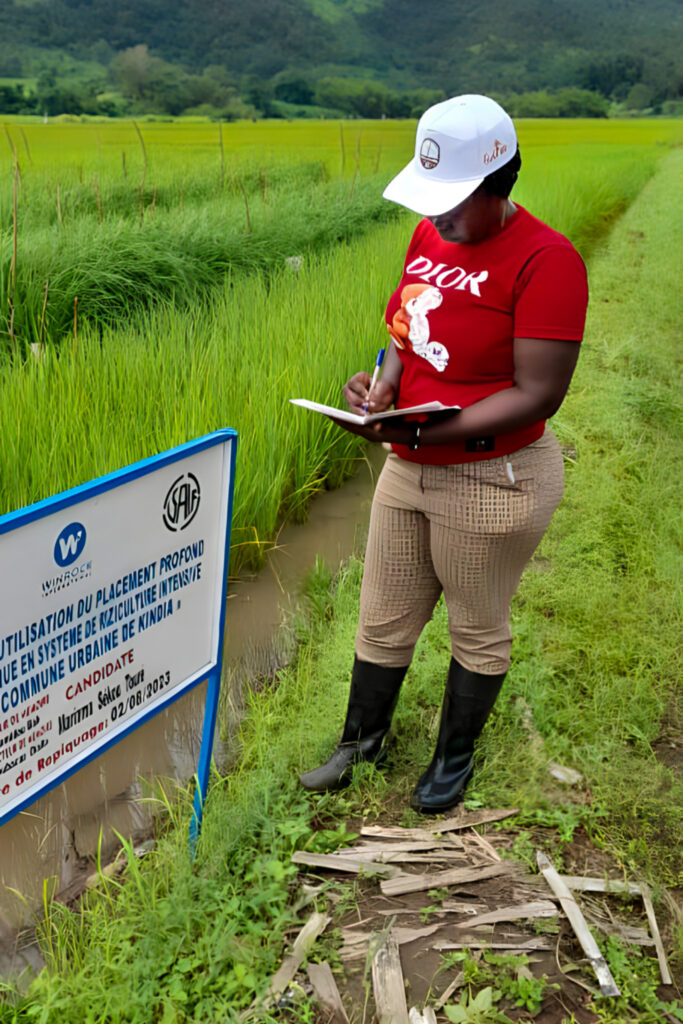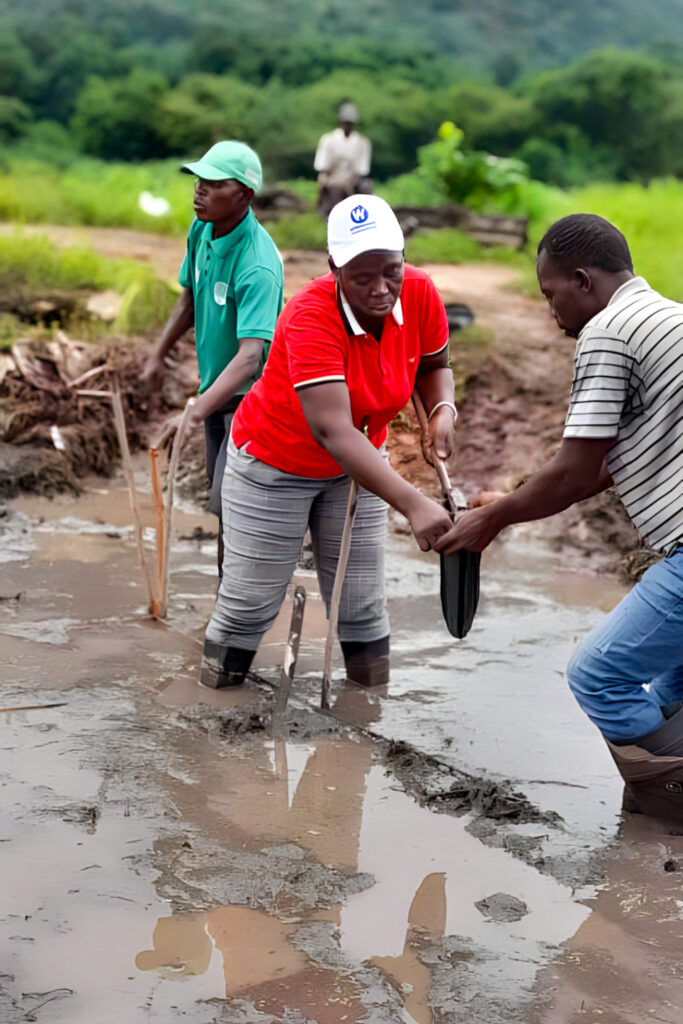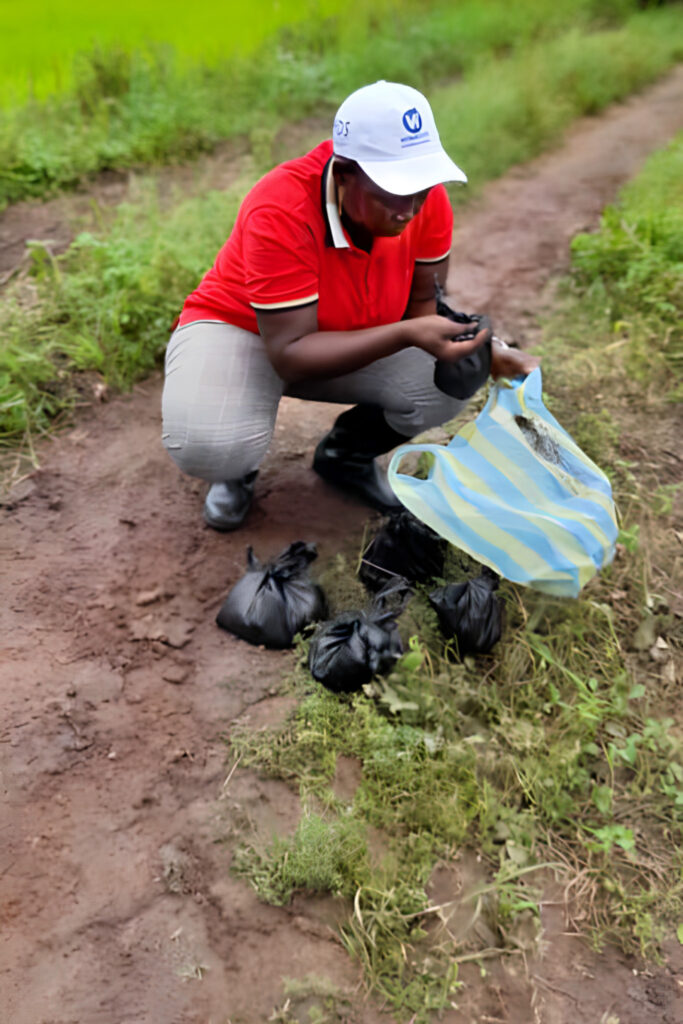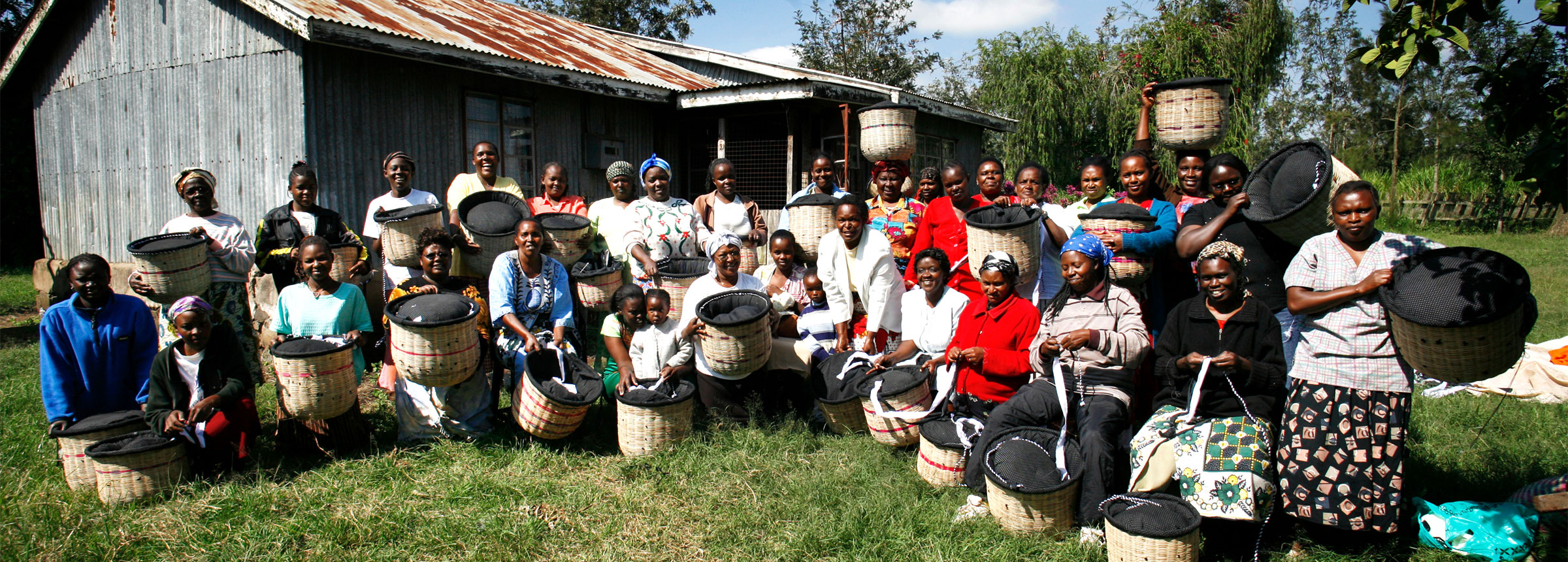Inspiring women in agriculture: A Havener-Dowswell Scholarship story
This blog and interview were produced by Sherri Kabaou, program manager with Winrock's Agriculture, Resilience & Water team.
Sherri Kabaou
In the heart of Guinea, recent graduate Mariame Sekou Touré is paving the way for sustainable development and inspiring women in agriculture. At 36, she has already made significant strides as an agricultural engineer, dedicating her career to transforming the lives of farmers through knowledge-sharing and practical support. Her journey into agriculture began at a young age, influenced by her father, who worked at the Bamba Agricultural Center in Kindia.
Growing up, she witnessed his dedication and the respect he garnered in the community. “Every morning, he would leave for work and only return in the evening,” she recalls. On weekends, Mariame would accompany him to the center, a routine that profoundly influenced her path. In a society where agricultural roles are often male dominated, she recognized an opportunity to break stereotypes and champion the cause of rural women.
With support from the Havener-Dowswell Scholarship program administered by Winrock, Mariame was able to complete her degree, taking a major step toward her dream of advancing food security in Guinea. This scholarship, created by Robert and Elizabeth Havener along with Christopher Dowswell, aims to support African women pursuing degrees in agricultural sciences and extension. The vision behind the scholarship is clear: to improve socio-economic development and boost food security in Africa by empowering women with access to specialized education.
For Mariame, this scholarship wasn’t just financial support; it was an investment in her future. It allowed her to pursue advanced studies in agricultural sciences, bringing her closer to her goals of supporting farmers and advocating for sustainable practices in her country.

The Havener-Dowswell Scholarship is part of a larger mission to empower African women in agriculture, recognizing their vital role in the continent’s development. Through this initiative, scholarship recipients like Mariame are able to pursue education that enhances their knowledge and skills, equipping them to bring new resources and techniques to their communities.
The scholarship enables women to address key issues in agriculture and sustainability, from food security to environmental protection, by equipping them with the knowledge they need to make a meaningful impact. For Mariame, her recent graduation marks the beginning of a new chapter in her career, enabling her to contribute more effectively to the agricultural sector and improve the livelihoods of rural communities.
As she steps into her career, Mariame carries with her a strong commitment to helping farmers implement sustainable practices. She believes that agriculture goes beyond food production, encompassing environmental stewardship and consumer safety. Her education has reinforced her dedication to sustainable practices and water management, both of which she sees as essential for Guinea’s future food security.
Mariame’s story is a powerful example of the transformative impact of education, and her work is a testament to the difference that initiatives like the Havener-Dowswell Scholarship can make. By supporting women in agriculture, the scholarship not only changes individual lives but also uplifts entire communities, creating a legacy of knowledge, empowerment and growth for generations to come.
Support the dreams of women like Mariame and help create a sustainable future by donating to the Havener-Dowswell Scholarship Fund: To learn how to help, click here.
About the scholarship:
Robert Havener and his wife, Elizabeth, both felt strongly that to improve socio-economic development and boost food security in Africa, more African women needed access to education including specialized agriculture extension training. Christopher Dowswell served as an aide-de-camp (chief assistant) to Norman Borlaug, an American agronomist, for more than 30 years, and, like Havener, was committed to the idea that agriculture could ─ and must ─ play a significant role in improving people’s lives, especially in the world’s most food insecure regions. Both Havener and Dowswell worked tirelessly on behalf of the Sasakawa Africa Association founded by the Japanese philanthropist Ryoichi Sasakawa and Borlaug in 1986 to support smallholder farmers and improve access to agricultural extension in Africa.
The Havener-Doswell Scholarship offers a simple and effective way to increase the number of qualified women agriculture extension agents in Africa. The scholarship enables women to pursue degrees in agricultural sciences and extension, to empower women farmers through improved access to knowledge, more effective use of agricultural inputs, and links to training and other resources. As more women farmers gain access to better agricultural technology and production information, agricultural production and incomes will rise, resulting in reduced poverty and hunger.
The scholarships provide about 50% of the estimated stipend and research support required for recipients to pursue an advanced degree in the agricultural field in Africa. Scholarship funding can be used for any study-related expenses including tuition, examination fees, and/or research expenses. Scholarships are limited to students who are enrolled in educational institutions in countries in Africa where Winrock maintains project field offices.
To qualify, students must demonstrate the potential for future success in the field of agriculture, and meet the following criteria:
- Commitment to studying the field of agriculture, with priority given to the study of agricultural extension, as well as interest in pursuing a related job or career at an African institution(s);
- Desire to apply education in local communities in Africa;
- Academic achievement;
- Financial need;
- Currently located in a country where Winrock maintains a presence (e.g., through a project or activity field office.)
In her own words: Mariame’s story
Can you please tell me a bit about your background, where you are from, and about your family?
My name is Mariame Sékou Touré, I am 36 years old, married, and the mother of a daughter. I am an agricultural engineer, who graduated from the Institute of Faranah. I completed a seven-year internship at the National Agency for Agricultural Promotion and Advisory Services before being hired as a government official within the same agency. I first worked as an assistant in the Legal Support and Regulatory Framework Unit, then as the head of the division for support to farmers’ organizations. Currently, I am in charge of the research unit at the Kilissi agricultural research station in Kindia.
Why did you choose a career in agriculture?
I realized that to ensure sustainable development in our country, it is essential to focus on the primary sector, particularly agriculture. Moreover, the profession of agronomist offers many job opportunities in our country.

Can you tell me about growing up and what started your interest in agriculture and agricultural extension?
I am my father’s second child. I lost my mother at a very young age and was raised by my father, who was the head of the Bamba Agricultural Center in Kindia. He often brought home agricultural products that he shared with the neighbors, and he was highly respected and listened to in the neighborhood. Every morning, he would leave for work and only return in the evening. On weekends, we often went to the center together, and I must say, this had a strong influence on me.
As a woman, I thought that I could gain respect in a profession generally perceived as being reserved for men. Regarding agricultural extension, I am convinced that the message sometimes resonates better when delivered by a woman. In certain situations, it can even be seen as a new approach.
What are your goals in agricultural extension?
My goal is to do everything possible to ensure that every farmer receiving agricultural advice can improve their living conditions by applying the knowledge gained. I also aim to dispel the misconceptions that hinder women’s involvement in the development process.
What has the scholarship meant for you personally and professionally?
Earning this master’s degree will facilitate my access to a Ph.D., which is a significant asset for my career. This scholarship has therefore allowed me to take an important step in my personal and professional development.
How has your education in agricultural sciences impacted your perspective on farming and food security?
My training in agronomy has taught me that agriculture is not limited to the simple production of food. It also encompasses crop protection, consumer safety, and the preservation of the environment (water, soil, atmosphere). Additionally, it involves the management of agricultural supply chains and the organization of stakeholders at every level.
What challenges have you faced as a woman in the agricultural sector, and how have you overcome them?
In a predominantly male environment, both administratively and practically, women are sometimes underestimated. We are often seen as less capable of enduring certain tasks or speaking up in front of men, particularly the farmers. To overcome these obstacles, I was able to convince my supervisors to give me a chance. With every opportunity, I made sure to carry out the tasks in an exemplary manner and to provide high-quality reports.
Can you share a success story or memorable experience from your work in agricultural extension?
After graduating from university, despite my five years of study, I was determined to prove my skills. I found an abandoned plot of land in Friquiagbé (Kindia) that the owner had neglected due to its low profitability. I negotiated to work the land for two years. First, I prepared the soil thoroughly and then set up a tomato nursery nearby. Three months later, the harvest was a great success, attracting attention and praise from many visitors, as well as requests for advice. Thanks to this, I was able to complete a first production, followed by a second that was even more profitable. However, the owner returned before the end of our contract, apologizing and taking back possession of the land that I had improved with so much effort.
How do you see the impact of sustainable agriculture and water resource management on the future of the agricultural sector in Guinea?
Sustainable agriculture and water resource management are essential for the future of the agricultural sector in Guinea. They play a crucial role in ensuring the long-term viability of agricultural practices, safeguarding the environment, and enhancing productivity. By adopting sustainable practices, Guinea can not only improve its agricultural output but also align with global trends and standards, potentially increasing its competitiveness on the international stage.

What advice would you give to other young women interested in pursuing a career in agriculture?
I would start by saying that women have the power to open any door. Whatever they desire with determination, they can achieve with success. To all those who wish to enter agriculture, don’t hesitate — go for it! It is impossible to achieve sustainable agriculture without acknowledging the significant contribution of rural women, who play a crucial role at every stage of production, often alongside men and sometimes leading certain activities on their own. However, they have limited access to land, resources, credit, technology, education, training, and information. Therefore, I encourage all women to unite in support of these rural women and help them overcome these challenges.
Related Projects

